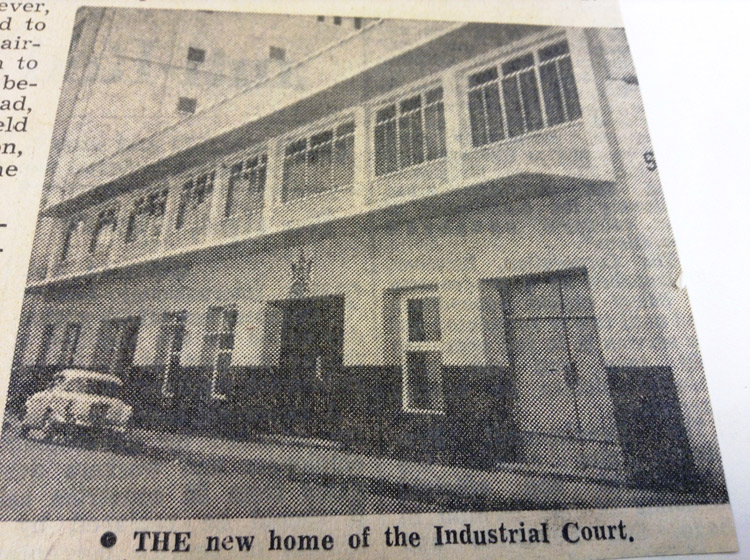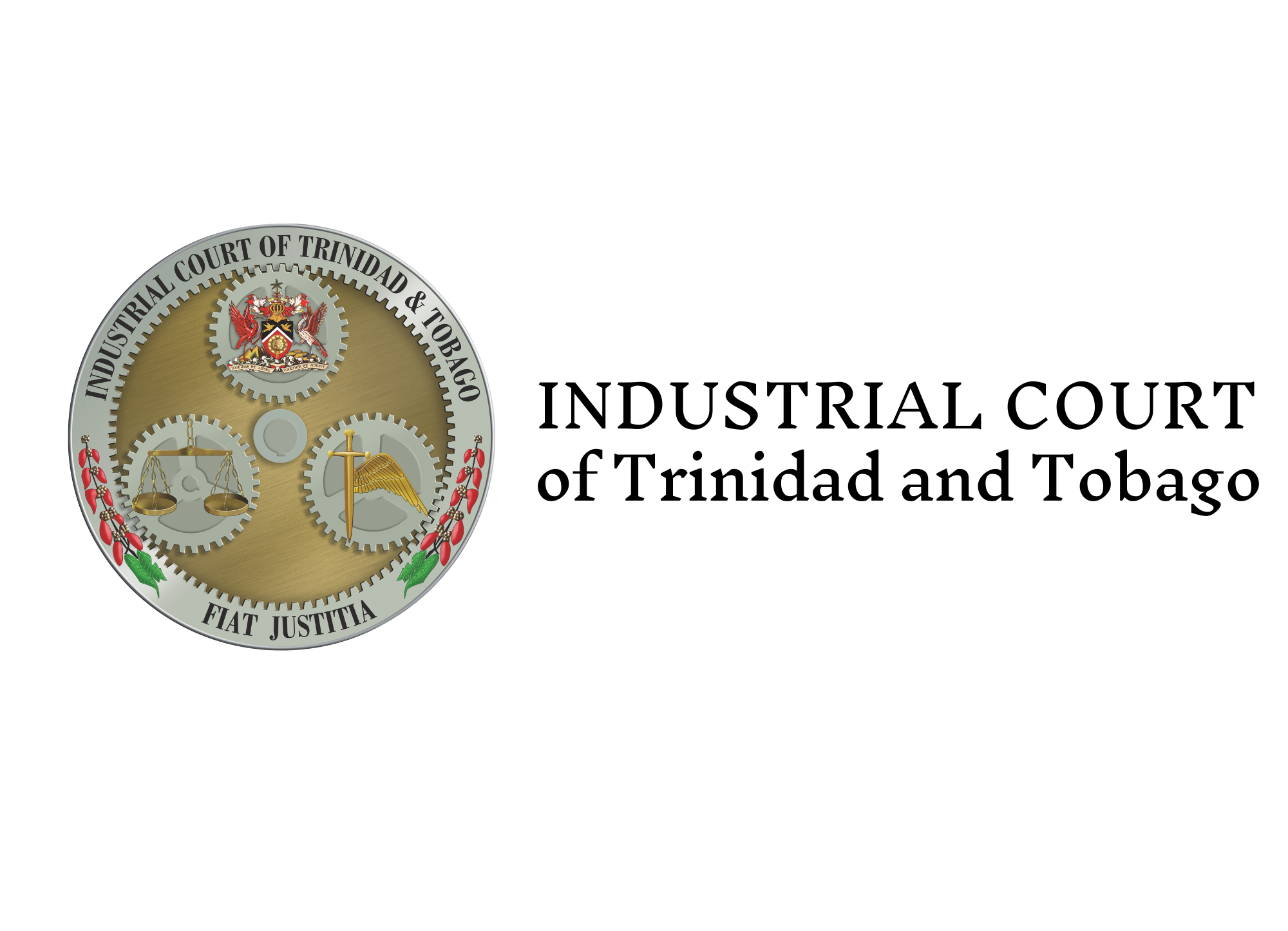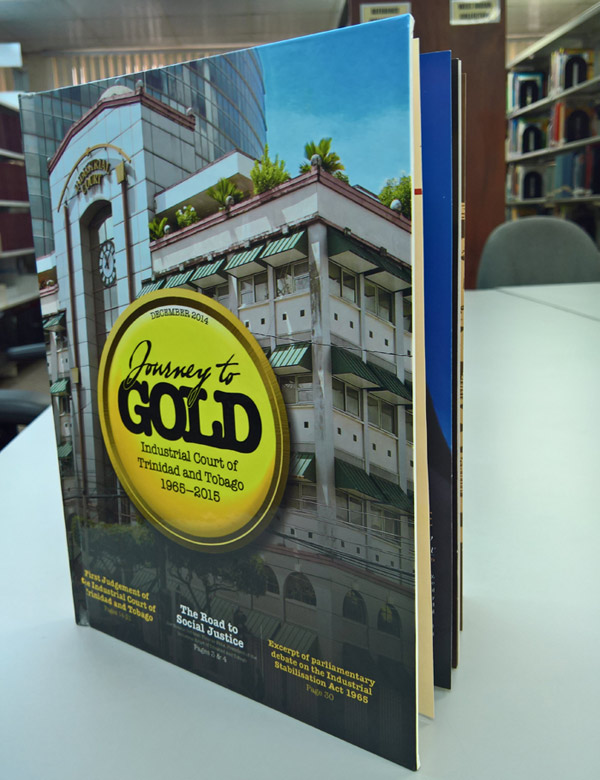During the period 1960 to 1964, Trinidad and Tobago was plagued by a number of strikes by workers and lockouts by employers which affected the economy. As a matter of fact, the Hansard records show that during that period, there were 230 strikes involving 74,574 workers resulting in 803,899 man days lost.
In response to the growing unrest in the industrial relations climate, the Government introduced the Industrial Stabilisation Bill in the House of Representatives on March 18, 1965. The Bill was passed in Parliament on March 19, 1965 and was assented to by Governor General Sir Solomon Hochoy the next day. Thus on March 20, 1965, the Industrial Court of Trinidad and Tobago was established by Section 5(1) of the ISA and became the first Industrial Court in the English speaking Caribbean. The purpose of the Act as stated in its preamble was "to provide for the compulsory recognition by employers of trade unions and organisations representative of a majority or workers, for the establishment of an expeditious system for the settlement of trade disputes, for the regulation of prices of commodities, for the constitution of a court to regulate matters relating to the foregoing an incidental thereto."
When the Industrial Stabilisation Act (ISA) was proclaimed there was a dramatic change in the practice of labour relations and employment law in Trinidad and Tobago. The Act provided for compulsory arbitration among social partners and the vehicle for this arbitration was the Industrial Court.
At its inception in 1965, the complement of Judges was five (5) which consisted of the President who was the Honourable Mr. Justice Sir Isaac Hyatali, Dr. Zin A. Henry, Mr. Harold A. Hutson, Mr. Gregory C. Awang and Dr. James Lewis. In 1967, the ISA was amended to allow for the increase in the membership of Judges of the Court from five (5) to seven (7) and the amendment also enabled the Court to sit in more than one Division as long as the President or Vice President presided as the Chairman.
However, in the matter of Trinidad Bakeries Ltd. & National Union Foods, Hotels, Beverages and Allied Workers & The Attorney General on behalf of the People of Trinidad and Tobago, [Civil Appeal 53/1966 (TD 2 of 1966)], the Court of Appeal ruled that the “Industrial Court has no jurisdiction to make a non-consensual order or award for the reinstatement of dismissed workers and that, accordingly, it acted ultra vires in making such an order”. In short, the Industrial Court had no power to reinstate workers. As a result, there was a second amendment to the ISA (Act No. 11 of 1967) on June 14, 1967, which conferred powers to the Industrial Court to reinstate workers to the Industrial Court. This Amendment also made the Industrial Court a Superior Court of Record with all the powers inherent in such a court.
The constitutionality of the ISA was challenged in the famous case of Collymore v. Attorney-General 1967, [(1967) 12 WIR 5; (1969) 2 ALL ER 1207], and as a consequence of that challenge the Act was repealed and replaced by the Industrial Relations Act 23 of 1972 (IRA). This act made “better provision for the stabilisation, improvement and promotion of industrial relations”.
The new IRA facilitated the creation of the Office of Economic and Industrial Research the main purpose of which is to provide research to support the Industrial Court and the social partners of the industry.
The Registration, Recognition and Certification Board is also a creation of the IRA. Its main function is to peruse applications which are made by Trade Unions for bargaining status and to issue Certificates of Recognition where necessary.
The first amendment of the IRA was in 1978, (Act 44 of 1978), this amendment provided for two (2) Divisions of the Court, namely, General Services Division (GSD) and the Essential Services Division (ESD).
In 1979, the IRA was further amended (Act 2 of 1979) to provide for the President of the Republic of Trinidad and Tobago to indicate to which Division of the Court, Judges were appointed. The last amendment of the IRA was in 1987, (Act 3 of 1987). This amendment enabled the Minister of Labour to refer an unresolved dispute to the Industrial Court after a period of three months (3) or more of continuing industrial action.
Over the years, additional legislation was placed under the jurisdiction of the Industrial Court to strengthen the Court’s ability to adequately dispense social justice. These legislation include the Minimum Wages Act Chapter 88:04, the Retrenchment and Severance Benefit Act Chapter 88:13, the Maternity Protection Act Chapter 45:57 and the Occupational Safety and Health Act Chapter 88:08.
 Not only did the legislation evolve, but the Court expanded its operations to improve access to justice. On April 29, 1965, the new Industrial Court held its first sitting at the Sixth Supreme Court, situated at the Red House – which also housed the Parliament for the Republic of Trinidad and Tobago - in Port of Spain, Trinidad. At that first sitting, judges convened to hear the trade dispute between the Federated Workers Trade Union and the University of the West Indies, St. Augustine & the Attorney General on behalf of the people of Trinidad and Tobago. By October, 1965, the Chronicle Building on St. Vincent Street, Port of Spain was renovated to house the Court.
Not only did the legislation evolve, but the Court expanded its operations to improve access to justice. On April 29, 1965, the new Industrial Court held its first sitting at the Sixth Supreme Court, situated at the Red House – which also housed the Parliament for the Republic of Trinidad and Tobago - in Port of Spain, Trinidad. At that first sitting, judges convened to hear the trade dispute between the Federated Workers Trade Union and the University of the West Indies, St. Augustine & the Attorney General on behalf of the people of Trinidad and Tobago. By October, 1965, the Chronicle Building on St. Vincent Street, Port of Spain was renovated to house the Court.
In 1995, then Prime Minister, the Honourable Patrick Manning, turned the sod at the site for the new Industrial Court building and two years later on May 27, 1997, then Prime Minister the Honourable Basdeo Panday, handed over the building at its current location to then President of the Industrial Court, His Honour Mr. Leopold P.E. Ramchand.
On February 15, 2005, under the leadership of then President His Honour Mr. Addison M. Khan, the Court expanded its operations to southern Trinidad when it opened a Branch in San Fernando. In 2015, under the leadership of the immediate past President, Her Honour Mrs. Deborah Thomas-Felix, the Court achieved another significant milestone when it acquired the Sandy Hall Building in Scarborough, Tobago which will be renovated to house the Tobago branch of the Industrial Court.
Since the establishment of the Industrial Court in 1965, seven (7) individuals have been bestowed the honour to serve as President of the Industrial Court of Trinidad and Tobago. They are the Honourable Mr. Justice Sir Isaac Hyatali (1965-1972), His Honour Mr. John A.M. Braithwaite (1972-1989), His Honour Mr. Leopold P.E. Ramchand (1989-1999), His Honour Mr. Addison Khan (1999-2005), His Honour Mr. Cecil O. Bernard (2005-2011), Her Honour Mrs. Deborah Thomas-Felix (2011-2023) and current President Her Honour Mrs. Heather Seale (2023 to present).


